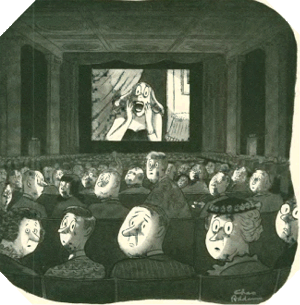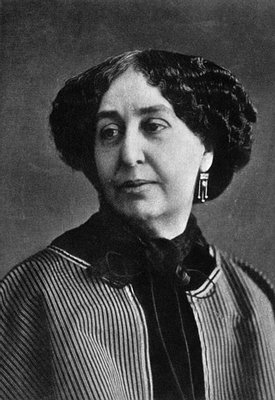
"Forty Feet below two million pounds are buried"
... found 90 feet deep, Oak Island [http://www.activemind.com/Mysterious/Topics/OakIsland]
... found 90 feet deep, Oak Island [http://www.activemind.com/Mysterious/Topics/OakIsland]
curious people | curious events | curious juxtapositions | iconoclasts | ambiguity | whatever


 There’s an old adage (attributed to Herodotus) that says “a man calumniated is doubly injured—first by him who utters the calumny, and then by him who believes it". Certainly George Sand (1804-76) could be counted amongst those whose reputation has suffered such calumny both for her work and probably more for her relationship with Chopin. In her own time, she was lionized for her writings which have since fallen far short of being considered classics today even though her main subject was love (“All novels are love stories” she remarked), and her persistent theme the legal inequities for women in marriage. She wrote numerous novels (among them Indiana, Lelia, and Consuelo) as well as numerous plays, autobiography, political essays (Bakunin urged Marx to read her), travel books, journals and copious brilliant letters, the most celebrated to Flaubert, with whom she corresponded for years. Her admirers included Balzac, Turgenev, Dostoevsky, Margaret Fuller, Walt Whitman, Elizabeth Barrett Browning, George Eliot and Charlotte Bronte. The last three thought her the greatest French stylist of her time.
There’s an old adage (attributed to Herodotus) that says “a man calumniated is doubly injured—first by him who utters the calumny, and then by him who believes it". Certainly George Sand (1804-76) could be counted amongst those whose reputation has suffered such calumny both for her work and probably more for her relationship with Chopin. In her own time, she was lionized for her writings which have since fallen far short of being considered classics today even though her main subject was love (“All novels are love stories” she remarked), and her persistent theme the legal inequities for women in marriage. She wrote numerous novels (among them Indiana, Lelia, and Consuelo) as well as numerous plays, autobiography, political essays (Bakunin urged Marx to read her), travel books, journals and copious brilliant letters, the most celebrated to Flaubert, with whom she corresponded for years. Her admirers included Balzac, Turgenev, Dostoevsky, Margaret Fuller, Walt Whitman, Elizabeth Barrett Browning, George Eliot and Charlotte Bronte. The last three thought her the greatest French stylist of her time.  If you want my apartment,
If you want my apartment,